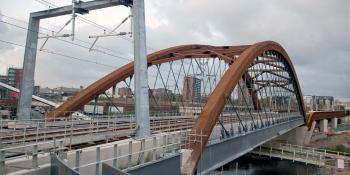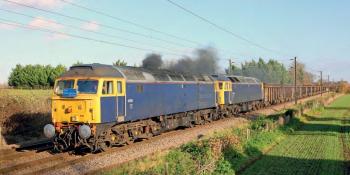Rail freight operators and customers have a lot at stake in the development of HS2.
The construction of Phase One will be a significant opportunity to use rail freight for outbound tunnelling spoil and inbound materials along the length of the route. Freight operators and materials suppliers are already in advanced discussions to facilitate this, and once the contracts are let, hopefully later this year, we expect to see significant investment in the necessary staff and resources to facilitate the work.
It is also expected that rail freight will benefit from the released capacity that HS2 will create south of Birmingham, and latterly Crewe. Although there are numerous aspirations for new services using this space, there remains a good case for additional freight paths in the off-peak, providing much-needed additional capacity for growth.
However, elsewhere the story is more complex, and the benefits less compelling. We have been concerned for some time that capacity on the West Coast main line north of Crewe, and between Crewe and Manchester, will not be sufficient even for existing freight services alongside HS2 and other passenger trains. Indeed, early work done on behalf of HS2 by Parsons Brinckerhoff (now WSP) suggested freight services would be severely affected, with Class 6 paths eliminated and trailing weights reduced to an unviable 1,000 tonnes, even with the use of electric locomotives.
RFG and its members have been raising these issues with HS2 and with Government for several years now. There has been good engagement and discussion, but to date, no further information has been made available and we have become increasingly concerned by the lack of progress as the 2026 opening date gets ever closer.
Freight operators and customers have also been perplexed by the Department for Transport’s decision to hand control of timetabling to the new West Coast Partnership franchisee, away from Network Rail. Although the Partnership will develop timetable ‘options’, there is a clear expectation that this will be the process by which the future train service pattern is then established. Whilst it is entirely rational to expect the Partnership to lead on the HS2 service pattern, and the interface with existing inter-city services, allowing the passenger franchise to dictate the capacity for freight is of concern, for however benevolent the franchisee is, its focus will inevitably be to develop the best outcome for its own services.
It is for these reasons that RFG concluded it was necessary to raise a petition against the Phase 2a bill.
As is the way with such processes, HS2 worked with us to offer assurances in some areas, including around the future design of Crewe station, but was unable to offer any satisfactory assurance on capacity.
To compound matters further, HS2 laid an ‘alternative provision’ – a mechanism for making small changes to a draft bill after it has been laid – which changes the proposed layout at Handsacre Junction, where HS2 trains rejoin the West Coast. The new design brings HS2 trains onto the slow lines, not the fast lines as in the previous design, creating a direct conflict with freight. Whilst there are many good reasons for the change, not least reduced costs, no assessment had been done of the impact on freight, and we felt it necessary to also petition against this change.
Our case was heard by the HS2 Bill Select Committee in the House of Commons during May, and it was a fair hearing from all sides, with a good focus on the issues raised. We were particularly pleased the Committee was able to make a statement in its report, requiring that HS2 should ‘…give an absolute commitment to the industry that the capacity for freight train size, and capability, is maintained and improved’.
This is an important statement in framing the forward work programme for timetable development, but there is much yet to be done and achieved in the coming months. The freight industry will need to engage with the West Coast Partnership, once established, and set out the needs of the freight sector clearly and assertively. This must give particular attention to existing trains, but also keep open the opportunities for growth. We will also need to engage with Network Rail’s own timetable processes, as well as with the Office of Rail and Road to ensure all are joined up in delivering freight needs.
The Committee report is an important step in assuring our sector that freight will not be penalised as HS2 moves forward, but it is unfortunate that we have had to go to such lengths to protect our existing rights. We can only hope that the forward development of Phase 2b, and in due course Northern Powerhouse Rail, does rather better.
An opinion column of the Rail Freight Group, www.rfg.org.uk




